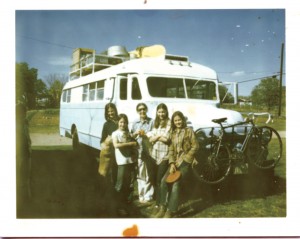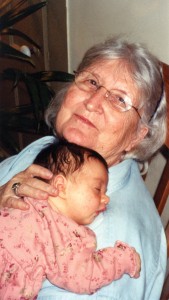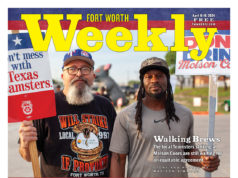In 1966 the Brink family moved briefly to Utah, where Betty and Charlie worked with the Job Corps. They moved back to Texas, to Beaumont, the next year. While Charlie worked on the air conditioning systems of offshore oil rigs, Brink worked in the anti-war and civil rights movements.

Threatening letters, including one with stab marks in it, arrived in the family mailbox, but she never backed down. A local radio DJ suggested Brink be taken outside of town and shot. She later made him into an ally.
When administrators at Lamar University ruled that only students could protest on campus, Brink signed up for a journalism course. But when she ran a peace flag up a campus pole and padlocked the halyard, she was banned from the campus — permanently.
“Maybe we’ll take some of her ashes and sprinkle them at Lamar,” Yarbrough said, laughing.
In 1968 Brink went to the Democratic National Convention in Chicago and helped students who’d been tear-gassed by police.
In Beaumont, Betty and Charlie joined an Episcopal church but met resistance when they began advocating for the black community. Church leaders announced they would be buying new carpet for the sanctuary and asked what color the congregation would prefer.
Brink stood up and said she would prefer for the money to be spent on shoes for poor black children who lived in a nearby shantytown. Her suggestion was ignored.
“She got up and walked out, and our little family walked out behind her, and we never went back,” Goodall-Rogers said.
By that time the writing bug had bitten, and Brink started What’s Left?, an underground newspaper, written anonymously, put together at the family’s kitchen table, and copied on a local church’s mimeograph machine. Brink wrote many of the stories but also relied on journalism students at Lamar University. Some stories criticized the university, and the school president threatened to expel any students who were involved.
“It was all very cloak-and-dagger and very fun,” Goodall-Rogers said.

Journalism was her new love, but Brink remained an activist at heart. She organized protests to support minorities and gays and spoke out against the Vietnam War. After one march in the late 1960s, she returned home to discover slashed tires on all the cars parked at her house and crude stickers attached to car windows: “The KKK Is Watching You.”
The Brinks returned to the Fort Worth area for a while, but were soon on the go again. Their son, Allen, turned 16 and became eligible for the military draft. Charlie bought a dilapidated school bus, painted it blue and white, transformed it into a recreational vehicle, and announced that the family was moving to Canada. Uncle Ralph facetiously called it the Blue Goose, and the name stuck. The family piled into the bus, hit the road, and ate plenty of brown rice and oatmeal over the next six months.
Then one day as she was cooking yet another meal on a stove outside the bus, Brink listened as President Richard Nixon, in a speech carried on the radio, announced he would suspend the draft. She started crying.
A few days later the Blue Goose rattled into the Brink driveway in Fort Worth, carrying the homesick Texans. The worn-out engine never started again. They were home for good.
Brink’s activism ran deep but rarely at the expense of family. When she wasn’t dragging her children to protest marches, she was taking care of a bustling household on not much income. She made her own bread, soap, and even deodorant. She churned her own butter. She braided her daughters’ hair before school.
“She was always there for us,” Yarbrough said.
********
Her children grew into adults and, one by one, moved away to start their own families. As her brood dwindled, Brink began to write freelance articles on civil rights and the anti-war movement. She continued writing for underground newspapers but also submitted articles to national magazines and mainstream dailies in the 1970s. They were rejected.
Her first big coup was an exhaustively researched piece on the My Lai massacre, in which a U.S. Army unit killed hundreds of civilians in South Vietnam in 1968. Fort Worth attorney Jim Lane, who represented several of the soldiers, helped Brink during her research. When The Boston Globe printed her story, her confidence and credibility as a writer zoomed.












I didn’t know Betty for nearly as long as everyone else. I’m just a 26-year-old upstart who’s worked at the Weekly full-time for less than a year. Unlike many veteran journalists that I’ve known, however, Betty treated me like a complete equal. As far as I could tell, she didn’t have a condescending bone in her body. I took over some of the stories that Betty would have written, and she was more complimentary of my work than it probably deserved. Every time I would tell her that so-and-so had talked about how talented she was, she’d always deflect the praise and bring it back to what I was doing. Betty wasn’t just a great journalist, she was a first-class human being and a woman who has always been ahead of her times, as evidenced by the cover story this week. Wherever I go in this career, I’ll take memories of her indomitable spirit with me.
Betty was forward thinking and rarely talked about her past exploits. She lived in the present. She was the first person I knew to buy a hybrid car. She was about 70 at the time. I gave her a hard time for spending $30k on a dinky little car with little power, but she was proud to own it. We clashed over a lot of things during the 12 years I worked with her, but none of our disagreements caused any problems in our friendship. I always enjoyed hanging out with her and taking her to Mexican food dives on the North Side to discuss stories we were working on. She’s the only person I know who would order a plate of enchiladas and a hot cup of black coffee to wash it down.
I was one of a few twentysomethings and college students who worked at FW Weekly when it started in the 1990s, in that little frame house where Lanny’s is now. We were in awe of Betty. We loved her stories about fighting injustice, and envied her ability to get the story and make her subjects, many of whom she took down with her words, still admire her. She treated every one of us, from full-timers to freelancers to interns, as equals. Her encouragement was welcome, her praise cherished. And she was always the hit when we met for an after-work beer. We’ll miss you, Betty. The world needs more like you.
I’m deeply saddened by this loss. I met Betty when I worked as the Art Director for the Fort Worth Weekly. Before I knew anything about her my first impression was, “What an extremely interesting and eccentric woman. I wan’t to be like her when I’m her age!” Then, as I got to know her over the years, I realized just how special she was. I was always glad to see Betty come into Production. I loved her stories and she loved my covers. 🙂 She lifted my spirit whenever I saw her. I will always admire you, Betty. You will always be one of my biggest role models. R.I.P. We love you.
What a beautiful tribute to a person who truly used their time on earth to benefit others and make the world a better place. Unlike those who claim to be civil rights activists, Betty “walked the walk”. Always the professional, investigative, journalist, her sole purpose was to uncover the truth, and speak for those who had no voice. Betty never let her “like” or “dislike” of a political figure get in the way of the truth. She dug for the facts and let the facts tell the story. Writing about FWISD was almost a full time job as the available material was abundant and remains never-ending. That has not changed. Tocco, Johnson, Dansby – to read Betty’s story on one, is to read a story on the other. The names have changed but the deeds and lack of leadership remain the same. I believe with her work on the AHHS/Palazzolo story, her great disappointment was the failure of taxpayers to take the importance of School Board membership seriously. She believed many on the Board were simply out of touch and had been there too long. She focused on FWISD because that is where she was needed. She was a true Texan who should forever remain an icon of Fort Worth.
Well said. Even though I often disagreed with her,she was some kind of fine Texas lady,and had a much more interesting life than I would have suspected. Her husband, children and grandchildren are obviously so proud of this wonderful woman. In fact, her life story –especially regarding the research of prison conditions at Carswell federal prison– would make an interesting movie screen-play….just sayin’. (and no, I don’t work for the FW school board,etc.)
BettyB’s absence already felt. I will miss her hard hitting articles and living proof no matter what your age, you can make a difference. She was a journalist and seeker of truth and justice all her life. May her family take pride in that and may she serve as an example to us all.
RIP.